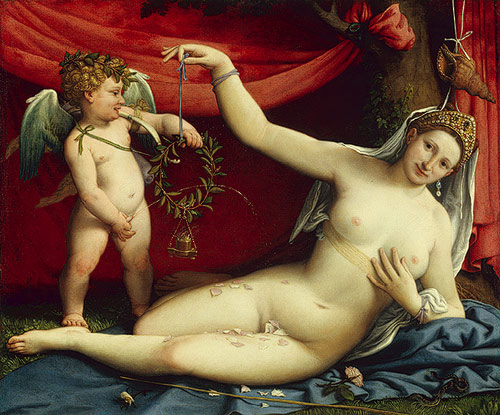In the late 1450s, the Italian humanist Bartolomeo Scala wrote a long letter of advice to Piero de Medici, son of the great Cosimo de Medici. Cosimo had been the unofficial ruler of Florence for thirty years, and was known for his generosity, learning, and patronage of the arts. Scala’s letter was written in the form of an essay entitled Whether a Wise Man Should Marry. It is unique in its sincerity, humor, and frank treatment of its subject matter. In good classical rhetorical style, the essay first lists the reasons why a wise man should not marry. It then presents counter-arguments as to why he should marry.
Arguments Against Marriage
For Scala, a “wise man” is he who “diligently pursues peace of mind and tranquility.” Such a man will pursue actions that tend to increase his peace and tranquility, since any other course would by definition be against his interests. Since wives, according to the philosopher Epicurus, are “on the borderline between good and bad,” the wise man would avoid marriage as an unacceptable risk. That being married was “on the borderline” between good and bad was something Scala considered self-evident, and not requiring any proof to a sexually experienced man.
However, says Scala, wives are certainly not all bad. Epicurus–in his view–was wrong. In fact, history is filled with examples of noble, brave, and virtuous women, and Scala warmly gives many vivid examples. He then cites the Greek philosopher Theophrastus, who laid down the rule that a wise man should marry only if four requirements are met:
1. The woman should be beautiful.
2. She should be of good character.
3. She should come from a good family.
4. The man should be in excellent health.
Theophrastus (says Scala) believed that since it is rare for all these conditions to be met, the wise man should only rarely marry. Beauty will always fade with age, Scala argues; every wise man who marries a beautiful woman will eventually find himself with an ugly one. Regarding a woman’s character, it is always difficult to know it with certainty. Most women are adept at concealing their faults behind a façade of sweetness. Scala amusingly notes how odd it is that some men will marry a woman without seeing anything of her body or knowing her character, yet will spend a great deal of time researching the acquisition of lesser things, like a horse, farm, or a business.
Even the oft-cited reason for marriage, the procreation of children, is a delusion, says Scala. To the wise man, offspring mean very little. Mothers-in-law will always be a torment. The consolation of carrying on one’s name after death is a false pleasure. The idea that a wise man’s children will comfort him in his old age is also a trap: for children usually bring us more heartache than pleasure. Although we hope for comfort in old age, we can expect an equal possibility of abandonment or misery, as our children are just as likely to rejoice in our death as to grieve over it.
Engraved portrait of Bartolomeo Scala, around 1460.
But what about love? Is this not a valid reason to marry? Nothing could be farther from the truth, argues Scala. Love is an emotional disturbance, he says, more akin to insanity. Quoting Seneca, he adds that love “is a close neighbor to madness.” More often than not, love “breaks the highest and most generous spirits.” Marriage cannot save us from solitude, says Scala. Marriage should never be undertaken to relieve loneliness, for “the wise man is never less alone than when he is alone”. A man should never think of himself as alone without a wife, “because even solitude is better than evil company.” Never make a decision for marriage based on fear.
Arguments For Marriage
What sort of “wisdom”, asks Scala, would make us retreat from the world in such a cowardly way as to avoid the risks and hazards of Nature? Is not a refusal to marry a blasphemy against life itself? If we are to take Nature as a guide to living, and family life is an imperative of Nature, then anyone to fights against Nature is by definition unwise, counter-argues Scala. Even the gentlest of animals is roused to ferocity in protecting its offspring. Is not having offspring a fundamental purpose of man? The continuation of life should be the concern of anyone who wishes to be called wise.
Furthermore, says Scala, Epicurus’s timid admonition to stay away from the risks of marriage seems more like unmanly fear than true wisdom. It seems more like a flight from life itself, and this type of fleeing is unbecoming to a wise man. A wise man needs calculated risks as a way of testing his fortitude and forcing him to improve. Love and marriage have inspired some of the noblest art, poetry, passion, and sentiment in history. History abounds with examples of noble, selfless, and virtuous women. Union with such a woman does not detract from the philosophic life, but actually enhances it. The right woman is no impediment to the scholar’s life or to philosophic thought.
Critique and Final Thoughts
Though society has changed much since his day, Scala says much of value. He may be forgiven for equating reproduction with marriage, since in his day marriages were normally arranged between families and not done for romantic love. He underestimated the importance of law and tradition in keeping marriage a worthwhile institution for men. He would undoubtedly be shocked to see the present state of the domestic law in the United States, which saddles the man with all the responsibilities of marriage, yet grants him none of the authority that existed in his day.
In short, marriage is much more risky today for men than it was in Scala’s era. In the 1450s, there were no child support orders backed by threats of imprisonment, no alimony payments, no domestic violence court, no restraining orders, and no police official willing to indulge the lies or fantasies of a jilted female. Existing institutions supported and cultivated the masculine ethic; men were valued and respected. This stands in sharp contrast to our own day, where societal institutions denigrate and punish healthy masculinity.
A man in Scala’s day could count on firm institutional backing from the Church, government, family and clan structures, and other existing social systems. There existed fraternal male-only trade guilds, military orders, religious fraternities, and associations of scholars (like the Academia Platonica in Florence). The man of today has no such support systems. Traditional bastions of masculine virtue in the West have been eviscerated or dismantled.
Even the military, for so long the final holdout against feminist inroads, is in the process of being reshaped into a gender-blind (i.e., female dominated) institution. In this brave new world, the wise man is truly on is own. He must be stronger, wiser, and more astute than ever before.
In my own opinion, marriage is sensible only if either one of the following scenarios apply:
1. Marry only if you want to have children and raise a family at that time. It should be your decision, not your girlfriend’s decision. It is irrelevant what her opinion is. This is not a decision that should be made in consultation with her. Since you will be the one paying for everything, you alone should ask yourself: do I want children? It should be a yes or no answer. If you are unsure, the answer is no. You must be prepared for a financial commitment that will last decades.
2. Marriages for companionship should be undertaken only when you have known her for at least several years, and have investigated all aspects of her character. A written prenuptial agreement should be arranged. All legal aspects of what you are doing should be clear to you. Nothing will protect you completely, of course, but at least you can have some firewalls in place to put her on notice that you are aware of your rights. Nothing in life is risk free. There are no guarantees of anything in life. At some point, one must do the best one can and trust to Fate.
With either one of these scenarios, certain other baseline conditions must be met. You probably should be at least 35 or older; a man needs a degree of real-world seasoning before he approaches his optimal maturity level. You should sincerely and truly be in love, and I mean the kind of love that would give teeth to the “till death do us part” phrase. You should have enough experience to know the warning signs of women to be wary of.
Some examples of these are: excessive lateness, antisocial tendencies (e.g., petty crime, drug use, or gambling), any hint of disdain for traditional feminine roles (e.g., cooking, cleaning, child-rearing), excessive criticism of you in any way, carelessness with money, and over-focus on career. This list is not exhaustive. Any flaw a woman has becomes magnified over time. A small problem now will become a big one later. You must test her and carefully observe her behavior when evaluating her character. Do not rationalize, excuse, or sugar-coat bad behavior. You must be utterly ruthless and clear-headed when evaluating her character.
But if we learn nothing else from Bartolomeo Scala’s advice, I hope the reader will remember the following timeless counsel: “Let [the wise man] not consider himself to be alone without a wife. For, as we are warned by an indisputable maxim, even solitude is better than evil company.”
Even solitude is better than evil company. Indeed. It is advice that has far too often gone unheeded.
Read More: The Father Of Relationship Game Shares His Secrets


